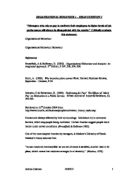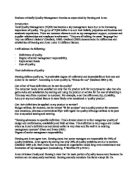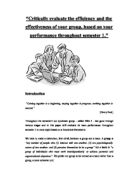Critics have argued that Maslow’s theory is arrogant, meaning it is impossible to make generalisations about needs and strengths, because every individual is unique. Maslow’s use of “armchair theorising” resulted in often-contradicted evidence. His theory explains what motivates staff, but what does it motivate staff to do? Hopefully increase standard of work, output, human relations, resulting in completion of manager objectives. (Cullen, 1997).
Herzberg’s Radical, and widely used Two-Factor Theory, avoids using the term “need”, and divided the work environment in to two main groups: “hygiene factors and motivators.” The Hygiene Factors simply assume that these are needed, not for an employee to feel motivated, but to stop them from feeling dissatisfied. E.g. salary, job security, appealing working conditions, quality of supervision, administration and impersonal relations. Hygiene factors ensure that a state of no dissatisfaction exists without them, motivators cannot work. (Herzberg, 1959).
Criticisms of Herzberg’s theory note that Herzberg’s methodology of research (critical incident technique) is flawed, because workers asked about experience of motivation often shift blame of bad experiences, on to their employers. As a result, the characterisation of hygiene, and motivator factors is flawed. Researcher biases could have occurred, and this technique generally makes things appear one sided without considering the individual. (Broadfield & Rollinson 2002).
Taylor’s theory of “scientific management” pro-pay to motivate, and was developed as he worked his way up from a labourer to a works manager. The concept behind his theory, has been constructed from his career experience, giving a certain element of bias. Taylor assumed that “humans respond as individuals, not groups;” “man is a rational and economic animal concerned with maximising his economic gain;” and “People can be treated in a standardised fashion, like machines.” (Taylor)
Taylor decided managers would benefit from his theories, purely because if the member of staff did not work, then they would not receive a fair day’s pay. However, if they met the targets, which were seen as a motivator, then the employee would receive extra bonuses. (Taylor)
Critics have argued that Taylor’s theory may work well with some, but it ignores the differences between people. Money may well motivate some, (extrinsic rewards which are tangible) however, things other than financial rewards might motivate others.
For example, McClelland’s Theory of Learned Needs suggests that some people (depending on the societies values acquired) have a desire to achieve, far more than to earn money i.e. intrinsic rewards like using skills or social rewards. (McClelland, 1967). This implies that managers who employ staff with the desire to achieve, will not be influenced by pay. This theory is all so backed by Kohn who said:
“Incentives do not alter the attitude that underlie our behaviours.” (Kohn A, 1993).
If this is the case, then it would be very difficult for an employer to use other means to motivate, because of their society values.
The British Journal of Industrial Relations performed a survey on the staff at the Inland Revenue. It was clear that a majority of the staff (57%) supported the principle of performance-related pay. However, when asked if PRP had raised their motivation at work, 12% “yes”, while 76% said “no”. It is clear therefore that the Inland Revenue, staff had little or no increase in motivation to change their output, or quality of work. The research conducted analysed staff views, rather than changes in output, a member of staff that believed they were less motivated, is very likely to be less motivated, purely because motivation is a state of mind.
i.e. does the: “person feel it appropriate to pursue a certain course of action, directed at achieving a specified outcome, and in which the person chooses to pursue those outcomes with a degree of vigour and persistence.” (Broadfield & Rollinson 2002).
The study found that most staff were de-motivated at IR. This might have happened because some thought the whole principle unfair, because they felt they had been cheated out of an award to which they were entitled. This all so backs up Herzberg’s Theory of Hygiene factors, suggesting that without e.g. appropriate salary, staff will feel de-motivated, and as a result, managers would be disappointed with the results.
55% of Inland Revenue staff felt that after PRP, their morale was undermined, and 25% disagreed, whilst others were uncertain. This shows that (although the evidence is uncertain in the Inland Revenue case), it would be easy to assume the motivational effect was actually negative.
Conclusion
In conclusion the research has shown that in the case of the Inland Revenue, the short-term workers were motivated by the scheme. Backing Maslow’s Theory of needs, that once an objective is achieved, a new one replaced it, as the older members of staff were not motivated by an increase in pay. Therefore, it could be said that managers would benefit from the increased staff pay to boost short term effects, but they will be dissatisfied with the results in the long term. The evidence suggests that Herzberg (1959) is right, in general in terms of his hygiene factors, but this system does not apply across the board. However, for most managers, the idea that adhering to the minimum working environment requirements, managers will not de-motivate staff, nor will it encourage people to remain in employment with the same company for many years.
Word Count:
1096
The assignment’s aim, is to give a critical understanding of how managers relying on pay to motivate their employees to higher levels of job performance, may or may not be satisfied with the outcome.
Humans are always affected by their surroundings. Motivators try to overcome barriers, which stop people being motivated. Certain theories suggest people work harder under certain conditions. (Broadfield & Rollinson 2002).
This involves researching theories of motivation, and then discussing what each say about pay as a motivator. I will then evaluate how worthwhile the information is, based on whether or not the theory is well regarded and supported by the researched literature.
Introduction







